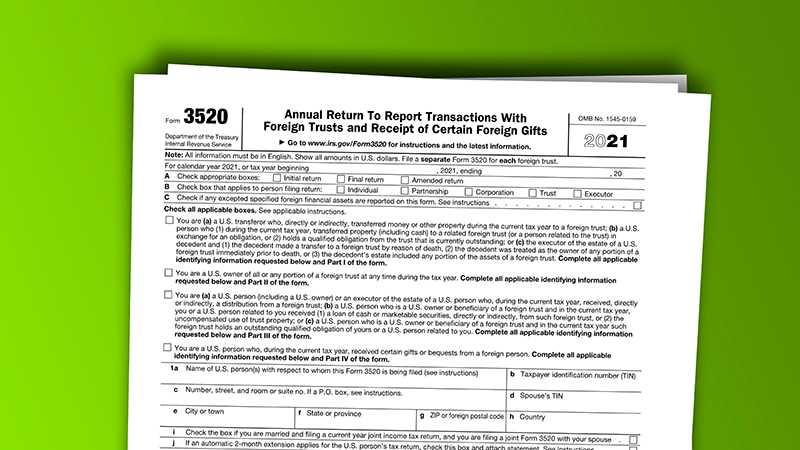Understanding the Value of Reporting Foreign Inheritance to IRS for Tax Obligation Compliance
Steering the complexities of international inheritance calls for a clear understanding of IRS reporting responsibilities. Many people ignore the value of precisely reporting these properties, which can result in unintentional effects. Failing to abide with IRS regulations might cause lawful problems and substantial fines. It is important to grasp the nuances surrounding international inheritances to stay clear of pitfalls. The complying with areas will certainly make clear vital facets of conformity and the potential risks included.

What Constitutes Foreign Inheritance?
When an individual gets possessions from a dead individual's estate situated beyond the USA, this transfer is considered a foreign inheritance. Foreign inheritances can include various kinds of possessions such as genuine estate, savings account, financial investments, individual items, and organization passions. The worth and nature of these assets might vary significantly depending upon the legislations and custom-mades of the country in which the estate lies.
In addition, the procedure of acquiring these possessions can include navigating with foreign legal systems, which might impose specific requirements or tax obligations connected to inheritance. The recipient might also run into obstacles in identifying the fair market price of the inherited properties, specifically if they are not aware of the local realty or economic markets. Recognizing what comprises an international inheritance is important for people to ensure compliance with both neighborhood legislations and any possible commitments they may have in their home nation.
IRS Reporting Needs for Foreign Inheritance
Exactly how does one guide with the IRS coverage demands for foreign inheritance? People who obtain an inheritance from abroad should know certain reporting obligations to assure compliance with IRS policies. The Foreign Financial Institution and Financial Accounts Report (FBAR) is one important need; if the total worth of foreign accounts goes beyond $10,000 at any time during the year, it must be reported. In addition, Form 3520 may be needed for reporting foreign presents or inheritances over $100,000 from non-U.S. persons. This kind records details regarding the inheritance, including the resource and amount. Stopping working to abide by these reporting needs can lead to substantial penalties. It is essential for recipients to keep comprehensive documents of the inheritance, including any kind of documentation from international entities. Consulting with a tax obligation professional experienced concerning international tax legislations can provide additional support in guiding through these reporting responsibilities properly.
Tax Implications of Getting an Inheritance From Abroad
Getting an inheritance from abroad can lug considerable tax ramifications for people, specifically as they browse the intricacies of international tax legislations. The IRS needs united state people and residents to report foreign inheritances, which may activate different tax obligation obligations - IRS Form 3520 inheritance. Although inheritances themselves are usually not considered gross income, reporting is important to prevent charges
In addition, the estate might undergo inheritance tax in the international nation, which can impact the internet worth gotten by the beneficiary. If the inheritance includes international properties, such as realty or financial investments, they may come with unique tax obligation factors to consider, including potential capital gains tax obligations upon sale.
In addition, individuals may require to abide with foreign tax laws, which can vary markedly from united state legislations. Recognizing these ramifications is essential for correct tax conformity and to ensure that all obligations are satisfied without incurring unneeded expenses or legal problems.
Common Errors to Prevent When Reporting Inheritance

Steps to Guarantee Compliance With IRS Laws
Comprehending the steps needed to ensure conformity with IRS guidelines is essential for any person reporting an international inheritance. Individuals should validate whether the inheritance goes beyond the reporting limit, which can activate extra requirements. Next, it is important to collect all pertinent paperwork, including the will, trust documents, and documents of the international estate's value.
Submitting Form 3520, which especially attends to international presents and inheritances, is necessary to notify the IRS of the inheritance. Individuals should also make sure that any kind of suitable taxes associated with the inheritance are paid, consisting of possible inheritance tax in the foreign jurisdiction.
In addition, keeping accurate documents of all communications and purchases relating to the inheritance can supply required assistance in situation of an IRS questions. Looking for expert guidance from a tax obligation consultant familiar with worldwide tax legislations can further boost compliance and mitigate threats connected with reporting foreign inheritances.
Regularly Asked Questions

What Happens if I Fail to Record My International Inheritance?
Falling short to report an international inheritance can lead to substantial her explanation penalties, passion on overdue tax obligations, and possible lawful repercussions. The IRS might seek enforcement activities, making complex future monetary transactions and compliance responsibilities for the private included.
Can I Deduct Costs Associated With Finding Foreign Inheritance?
No, costs associated with obtaining a foreign inheritance are typically not deductible for tax obligation functions. Inheritance itself is typically ruled out taxed income, and connected prices can not be asserted to lower tax obligation obligation.
Are There Charges for Late Reporting of Foreign Inheritance?
Yes, there are fines for late reporting of foreign inheritance to the IRS - reporting foreign inheritance to IRS. These can consist of fines and interest on unsettled tax obligations, making timely disclosure necessary for conformity and staying clear of added economic worries
How Does Foreign Inheritance Affect My State Taxes?
International inheritance may affect state tax obligations in different ways depending upon jurisdiction. Some states enforce inheritance or inheritance tax, while others do not. It is vital to seek advice from local guidelines to figure out certain tax implications connected to foreign inheritance.

Are Gifts From Abroad Considered Foreign Inheritance for IRS Purposes?
Gifts from abroad are not classified as foreign inheritance for IRS purposes. Form 3520 foreign gift. Rather, they are dealt with independently under gift tax obligation guidelines, with various reporting requirements and limits that individuals need to comply with for compliance
Furthermore, the process of getting these properties can entail maneuvering via international lawful systems, which could impose particular demands or tax obligations connected to inheritance. The Internal revenue service needs U.S. homeowners and residents to report foreign inheritances, which may trigger numerous tax commitments. Submitting Type 3520, which especially deals with international presents and inheritances, is vital to educate the IRS of the inheritance. Failing to report an international inheritance pop over to these guys can lead to considerable charges, rate of interest on unpaid taxes, and potential legal repercussions. No, costs connected to receiving a foreign inheritance are usually not insurance deductible for tax purposes.